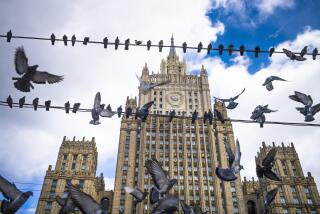Gorbachev Holds Kremlin Summit With Yeltsin
- Share via
MOSCOW — Soviet President Mikhail S. Gorbachev and Russian leader Boris N. Yeltsin held a virtual Kremlin summit meeting Wednesday to hammer out a common approach to the nation’s economic problems and reached evident consensus on a sweeping devolution of powers to the republics.
In the latest chapter of their long, tempestuous relationship, the Soviet Union’s two most powerful political figures--who clashed as recently as last week--met for more than three hours with an agenda that Gorbachev’s spokesman said included 50 items, from domestic to world affairs.
Both leaders spoke to Soviet television reporters during a break in their unprecedented talks, and Gorbachev, who looked wan and weary alongside the strapping Siberian populist, said the main purpose of the get-together was “to unite the efforts of all social forces” who favor reform.
“We have to exclude the influence of those crazy ultras from the right and the left,” Gorbachev said. “The rest of the forces of society have to be consolidated.”
On TV, both leaders were civil to a fault, although there was an obvious stiffness and lack of warmth between the Soviet president and Yeltsin, the president of the Russian federation, who is now the country’s most popular elected politician but who was fired in disgrace as Moscow’s Communist Party boss by Gorbachev in 1987.
“I may express a certain sorrow that such a capital meeting has been postponed, maybe by mutual fault of ours,” Yeltsin said at one point.
“I must say, we do not have either political or human problems or obstacles for us to peacefully discuss all issues,” added Gorbachev, stressing their ability to work together.
Earlier this month, Gorbachev and Yeltsin joined to create a group of economists charged with writing a common plan on the transition to a market economy for the Soviet Union and for Russia, which makes up two-thirds of the nation. It was a radical alternative to the more traditionalist blueprint offered by Prime Minister Nikolai I. Ryzhkov, which sparked panic in June because of its proposals for a doubling in food prices.
The economists’ panel has given itself until Saturday to come up with its final plan, and Yeltsin endorsed their work, evidently speaking for Gorbachev as well.
“The group has worked out good proposals, to our minds,” Yeltsin said. “These are radical measures and more resolute actions.”
He said the plan would be submitted at today’s meeting in Moscow of the Presidential and Federation councils, two advisory bodies headed by Gorbachev, and then would be sent to the legislatures of the 15 Soviet republics within a week for their comments.
“After this, as the finale of the program’s development, an economic treaty between the republics and the (Soviet) president should be signed,” Yeltsin said.
For his part, Gorbachev gave no details but said: “The time has come when we have to summarize and put forward a uniform document. In a week’s time, the program will be completed.”
Gorbachev’s new spokesman told a news conference that sweeping changes were in the offing, but he was no more explicit than his boss. “I would like to tell you that we’re on the threshold of a major decision, a real change in the economic structures and relations of the union itself,” said Vitaly N. Ignatenko, whose appointment was announced Tuesday.
Izvestia, the government newspaper, reported that the economists’ commission, which has been meeting in a dacha near Moscow, is proposing the “creation of an economic union of sovereign republics” as a way of solving economic problems and curtailing ethnic strife and nationalist demands.
That would be a major departure from the top-heavy centralization of the past and would meet demands from republic-level leaders such as Yeltsin for home rule and local control over natural resources. According to an independent Moscow business weekly, Commersant, Ryzhkov has said the plan could lead to the collapse of the Soviet Union.
According to Izvestia, the plan would freeze certain basic food prices during the initial stage of what Yeltsin’s allies have outlined as a 500-day process. Although other prices would be allowed to float to their market level, wages would be indexed to cushion the impact of inflation. A rapid privatization of property would also be encouraged.
If the commission’s plan is adopted, Ryzhkov’s political future will become dim indeed. His plan was rejected by the Soviet Parliament almost three months ago, and he has been given until September to revise it and resubmit it.
Yeltsin’s spokesman, Russian Information Minister Mikhail N. Poltoranin, predicted that Wednesday’s meeting would doom Ryzhkov’s chances: “‘The Ryzhkov program is suffocating, and his song is sung,” Poltoranin said by telephone. But he made it clear that Yeltsin will pursue his brand of economic reform for Russia whatever decision is made by the central government.
“If Gorbachev refuses to accept the 500-day program, Russia will certainly pass it, and this will be a very serious conflict,” Poltoranin said.
Wednesday’s meeting was only the latest page in the oddest Soviet political relationship in recent years, but one particular televised exchange showed the gap that still separates the men, despite their attempt to find common ground.
As they stood side by side discussing their negotiations, Gorbachev said, “The cornerstone should be the interests of perestroika, of renewal of the country, the interests of our people.”
“But not to the detriment of the sovereignty and interests of Russia,” interjected Yeltsin, who only last week rejected a Gorbachev decree ordering Russia to accept the central government’s control over its natural resources.
More to Read
Sign up for Essential California
The most important California stories and recommendations in your inbox every morning.
You may occasionally receive promotional content from the Los Angeles Times.













